Medication Error: Ethical and Legal Implications in Nursing Practice
VerifiedAdded on 2022/08/13
|5
|1206
|19
Report
AI Summary
This report analyzes a nursing scenario involving a medication error where a nurse practitioner prescribed an incorrect dosage to a child, and the subsequent dilemma of whether to disclose the error. The paper delves into the ethical and legal implications of non-disclosure, affecting the patient, family, pharmacist, and prescriber. Ethically, non-disclosure violates principles of beneficence and patient autonomy, potentially harming the child. Legally, such errors can lead to prosecution under tort law. The report outlines strategies for decision-making, emphasizing the importance of ethical obligations and adherence to state laws. The conclusion underscores the negative consequences of non-disclosure, highlighting the importance of disclosure to protect the child and avoid legal repercussions, while also suggesting strategies like double-checking medication orders and learning from others to minimize future errors.
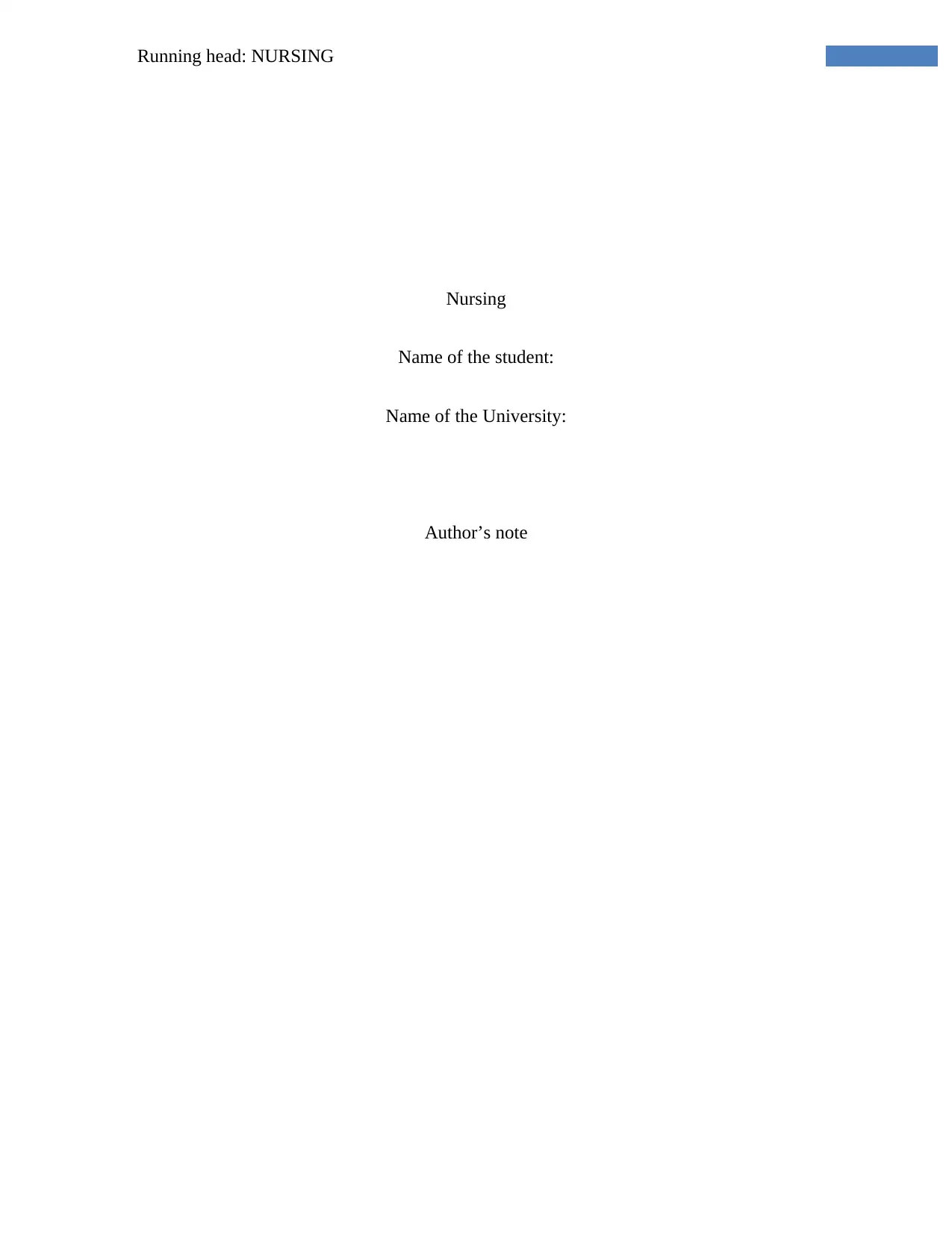
Running head: NURSING
Nursing
Name of the student:
Name of the University:
Author’s note
Nursing
Name of the student:
Name of the University:
Author’s note
Paraphrase This Document
Need a fresh take? Get an instant paraphrase of this document with our AI Paraphraser
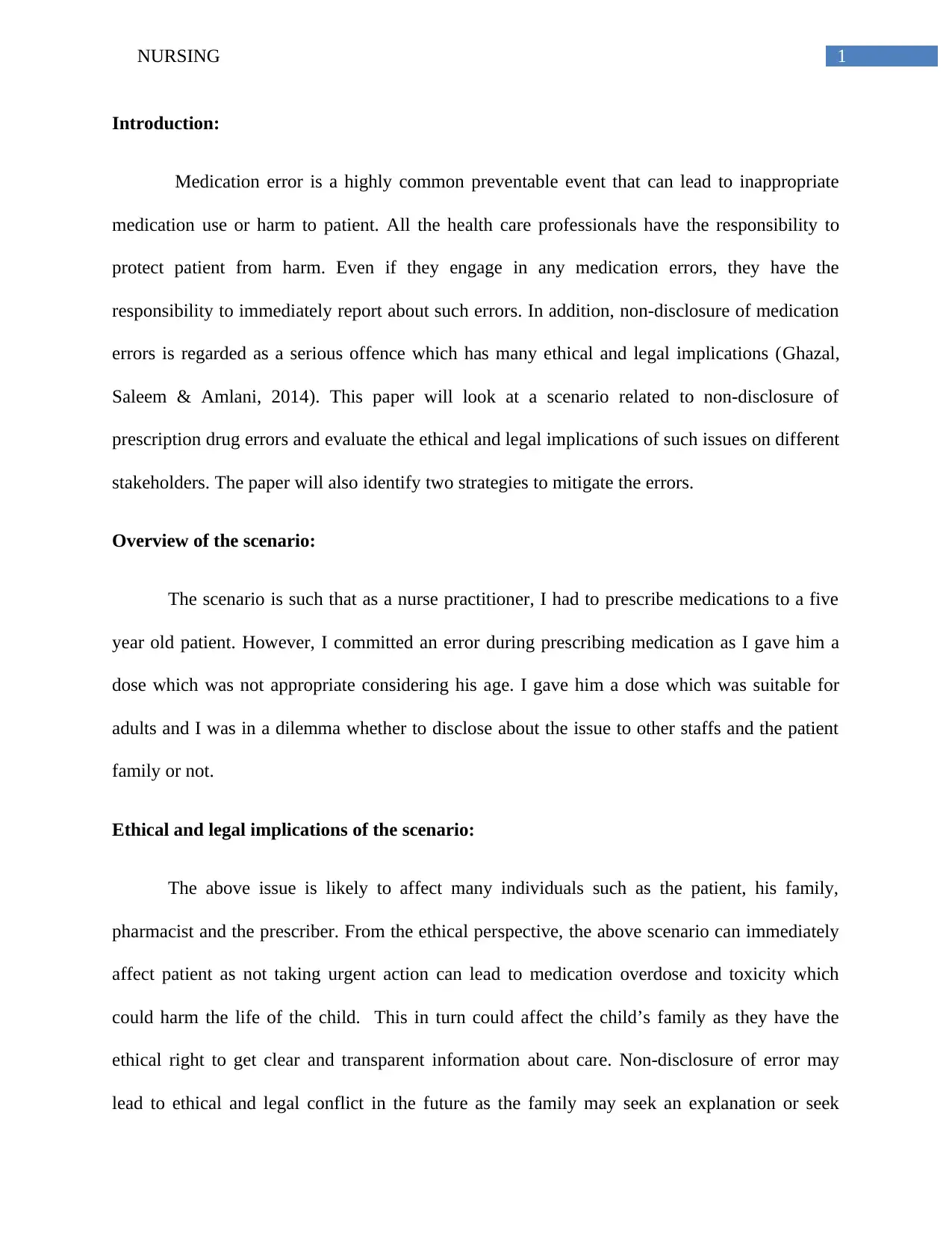
1NURSING
Introduction:
Medication error is a highly common preventable event that can lead to inappropriate
medication use or harm to patient. All the health care professionals have the responsibility to
protect patient from harm. Even if they engage in any medication errors, they have the
responsibility to immediately report about such errors. In addition, non-disclosure of medication
errors is regarded as a serious offence which has many ethical and legal implications (Ghazal,
Saleem & Amlani, 2014). This paper will look at a scenario related to non-disclosure of
prescription drug errors and evaluate the ethical and legal implications of such issues on different
stakeholders. The paper will also identify two strategies to mitigate the errors.
Overview of the scenario:
The scenario is such that as a nurse practitioner, I had to prescribe medications to a five
year old patient. However, I committed an error during prescribing medication as I gave him a
dose which was not appropriate considering his age. I gave him a dose which was suitable for
adults and I was in a dilemma whether to disclose about the issue to other staffs and the patient
family or not.
Ethical and legal implications of the scenario:
The above issue is likely to affect many individuals such as the patient, his family,
pharmacist and the prescriber. From the ethical perspective, the above scenario can immediately
affect patient as not taking urgent action can lead to medication overdose and toxicity which
could harm the life of the child. This in turn could affect the child’s family as they have the
ethical right to get clear and transparent information about care. Non-disclosure of error may
lead to ethical and legal conflict in the future as the family may seek an explanation or seek
Introduction:
Medication error is a highly common preventable event that can lead to inappropriate
medication use or harm to patient. All the health care professionals have the responsibility to
protect patient from harm. Even if they engage in any medication errors, they have the
responsibility to immediately report about such errors. In addition, non-disclosure of medication
errors is regarded as a serious offence which has many ethical and legal implications (Ghazal,
Saleem & Amlani, 2014). This paper will look at a scenario related to non-disclosure of
prescription drug errors and evaluate the ethical and legal implications of such issues on different
stakeholders. The paper will also identify two strategies to mitigate the errors.
Overview of the scenario:
The scenario is such that as a nurse practitioner, I had to prescribe medications to a five
year old patient. However, I committed an error during prescribing medication as I gave him a
dose which was not appropriate considering his age. I gave him a dose which was suitable for
adults and I was in a dilemma whether to disclose about the issue to other staffs and the patient
family or not.
Ethical and legal implications of the scenario:
The above issue is likely to affect many individuals such as the patient, his family,
pharmacist and the prescriber. From the ethical perspective, the above scenario can immediately
affect patient as not taking urgent action can lead to medication overdose and toxicity which
could harm the life of the child. This in turn could affect the child’s family as they have the
ethical right to get clear and transparent information about care. Non-disclosure of error may
lead to ethical and legal conflict in the future as the family may seek an explanation or seek
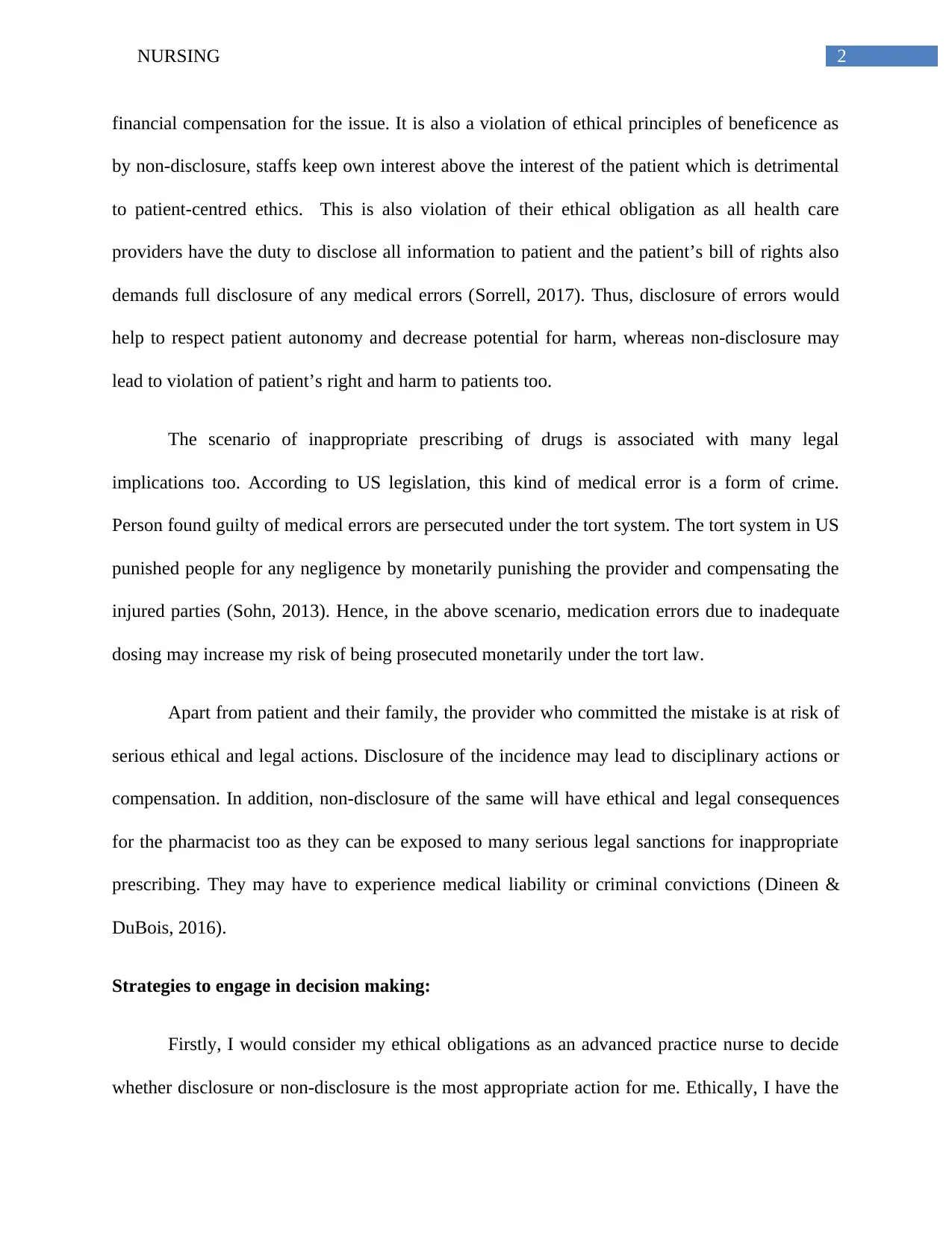
2NURSING
financial compensation for the issue. It is also a violation of ethical principles of beneficence as
by non-disclosure, staffs keep own interest above the interest of the patient which is detrimental
to patient-centred ethics. This is also violation of their ethical obligation as all health care
providers have the duty to disclose all information to patient and the patient’s bill of rights also
demands full disclosure of any medical errors (Sorrell, 2017). Thus, disclosure of errors would
help to respect patient autonomy and decrease potential for harm, whereas non-disclosure may
lead to violation of patient’s right and harm to patients too.
The scenario of inappropriate prescribing of drugs is associated with many legal
implications too. According to US legislation, this kind of medical error is a form of crime.
Person found guilty of medical errors are persecuted under the tort system. The tort system in US
punished people for any negligence by monetarily punishing the provider and compensating the
injured parties (Sohn, 2013). Hence, in the above scenario, medication errors due to inadequate
dosing may increase my risk of being prosecuted monetarily under the tort law.
Apart from patient and their family, the provider who committed the mistake is at risk of
serious ethical and legal actions. Disclosure of the incidence may lead to disciplinary actions or
compensation. In addition, non-disclosure of the same will have ethical and legal consequences
for the pharmacist too as they can be exposed to many serious legal sanctions for inappropriate
prescribing. They may have to experience medical liability or criminal convictions (Dineen &
DuBois, 2016).
Strategies to engage in decision making:
Firstly, I would consider my ethical obligations as an advanced practice nurse to decide
whether disclosure or non-disclosure is the most appropriate action for me. Ethically, I have the
financial compensation for the issue. It is also a violation of ethical principles of beneficence as
by non-disclosure, staffs keep own interest above the interest of the patient which is detrimental
to patient-centred ethics. This is also violation of their ethical obligation as all health care
providers have the duty to disclose all information to patient and the patient’s bill of rights also
demands full disclosure of any medical errors (Sorrell, 2017). Thus, disclosure of errors would
help to respect patient autonomy and decrease potential for harm, whereas non-disclosure may
lead to violation of patient’s right and harm to patients too.
The scenario of inappropriate prescribing of drugs is associated with many legal
implications too. According to US legislation, this kind of medical error is a form of crime.
Person found guilty of medical errors are persecuted under the tort system. The tort system in US
punished people for any negligence by monetarily punishing the provider and compensating the
injured parties (Sohn, 2013). Hence, in the above scenario, medication errors due to inadequate
dosing may increase my risk of being prosecuted monetarily under the tort law.
Apart from patient and their family, the provider who committed the mistake is at risk of
serious ethical and legal actions. Disclosure of the incidence may lead to disciplinary actions or
compensation. In addition, non-disclosure of the same will have ethical and legal consequences
for the pharmacist too as they can be exposed to many serious legal sanctions for inappropriate
prescribing. They may have to experience medical liability or criminal convictions (Dineen &
DuBois, 2016).
Strategies to engage in decision making:
Firstly, I would consider my ethical obligations as an advanced practice nurse to decide
whether disclosure or non-disclosure is the most appropriate action for me. Ethically, I have the
⊘ This is a preview!⊘
Do you want full access?
Subscribe today to unlock all pages.

Trusted by 1+ million students worldwide
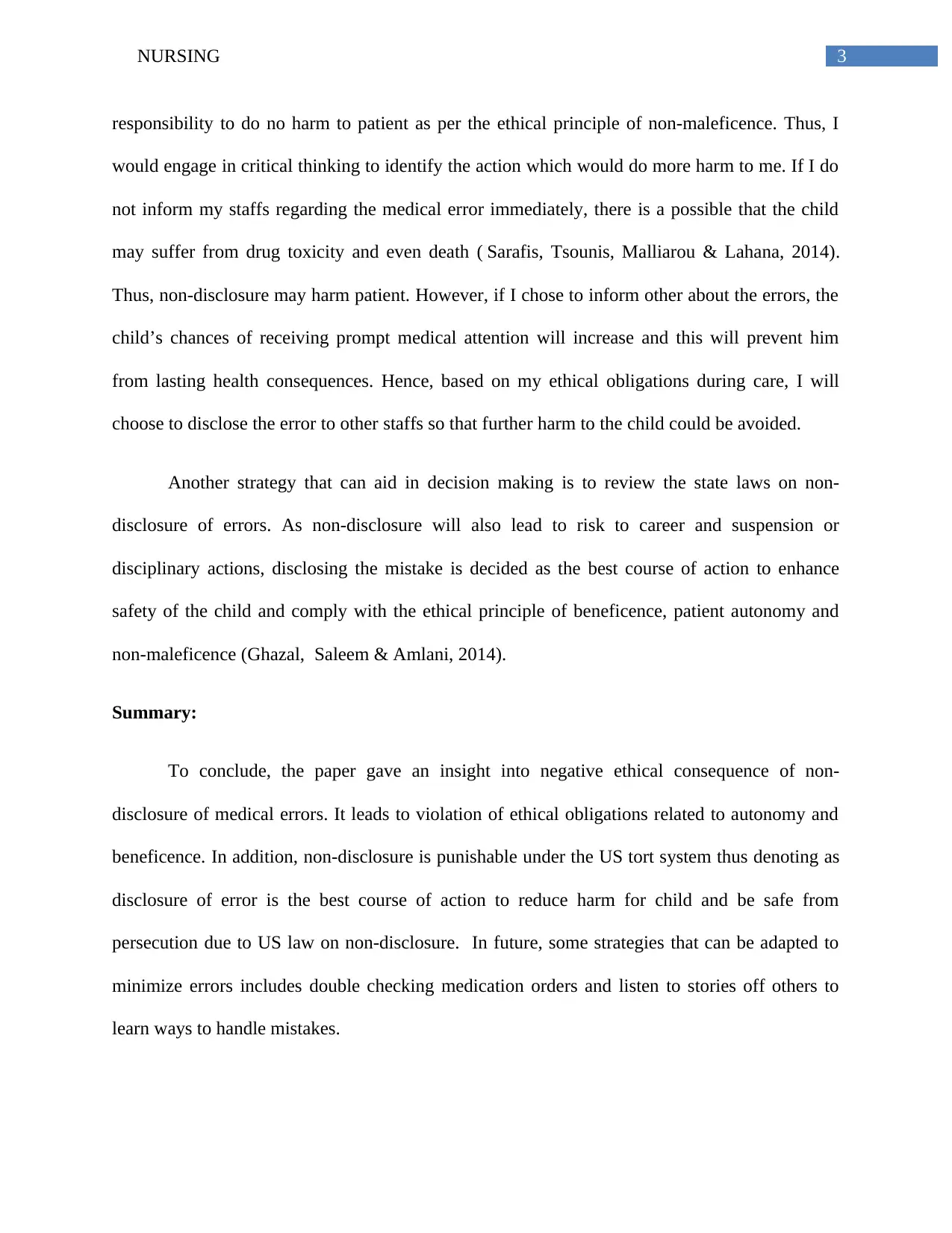
3NURSING
responsibility to do no harm to patient as per the ethical principle of non-maleficence. Thus, I
would engage in critical thinking to identify the action which would do more harm to me. If I do
not inform my staffs regarding the medical error immediately, there is a possible that the child
may suffer from drug toxicity and even death ( Sarafis, Tsounis, Malliarou & Lahana, 2014).
Thus, non-disclosure may harm patient. However, if I chose to inform other about the errors, the
child’s chances of receiving prompt medical attention will increase and this will prevent him
from lasting health consequences. Hence, based on my ethical obligations during care, I will
choose to disclose the error to other staffs so that further harm to the child could be avoided.
Another strategy that can aid in decision making is to review the state laws on non-
disclosure of errors. As non-disclosure will also lead to risk to career and suspension or
disciplinary actions, disclosing the mistake is decided as the best course of action to enhance
safety of the child and comply with the ethical principle of beneficence, patient autonomy and
non-maleficence (Ghazal, Saleem & Amlani, 2014).
Summary:
To conclude, the paper gave an insight into negative ethical consequence of non-
disclosure of medical errors. It leads to violation of ethical obligations related to autonomy and
beneficence. In addition, non-disclosure is punishable under the US tort system thus denoting as
disclosure of error is the best course of action to reduce harm for child and be safe from
persecution due to US law on non-disclosure. In future, some strategies that can be adapted to
minimize errors includes double checking medication orders and listen to stories off others to
learn ways to handle mistakes.
responsibility to do no harm to patient as per the ethical principle of non-maleficence. Thus, I
would engage in critical thinking to identify the action which would do more harm to me. If I do
not inform my staffs regarding the medical error immediately, there is a possible that the child
may suffer from drug toxicity and even death ( Sarafis, Tsounis, Malliarou & Lahana, 2014).
Thus, non-disclosure may harm patient. However, if I chose to inform other about the errors, the
child’s chances of receiving prompt medical attention will increase and this will prevent him
from lasting health consequences. Hence, based on my ethical obligations during care, I will
choose to disclose the error to other staffs so that further harm to the child could be avoided.
Another strategy that can aid in decision making is to review the state laws on non-
disclosure of errors. As non-disclosure will also lead to risk to career and suspension or
disciplinary actions, disclosing the mistake is decided as the best course of action to enhance
safety of the child and comply with the ethical principle of beneficence, patient autonomy and
non-maleficence (Ghazal, Saleem & Amlani, 2014).
Summary:
To conclude, the paper gave an insight into negative ethical consequence of non-
disclosure of medical errors. It leads to violation of ethical obligations related to autonomy and
beneficence. In addition, non-disclosure is punishable under the US tort system thus denoting as
disclosure of error is the best course of action to reduce harm for child and be safe from
persecution due to US law on non-disclosure. In future, some strategies that can be adapted to
minimize errors includes double checking medication orders and listen to stories off others to
learn ways to handle mistakes.
Paraphrase This Document
Need a fresh take? Get an instant paraphrase of this document with our AI Paraphraser
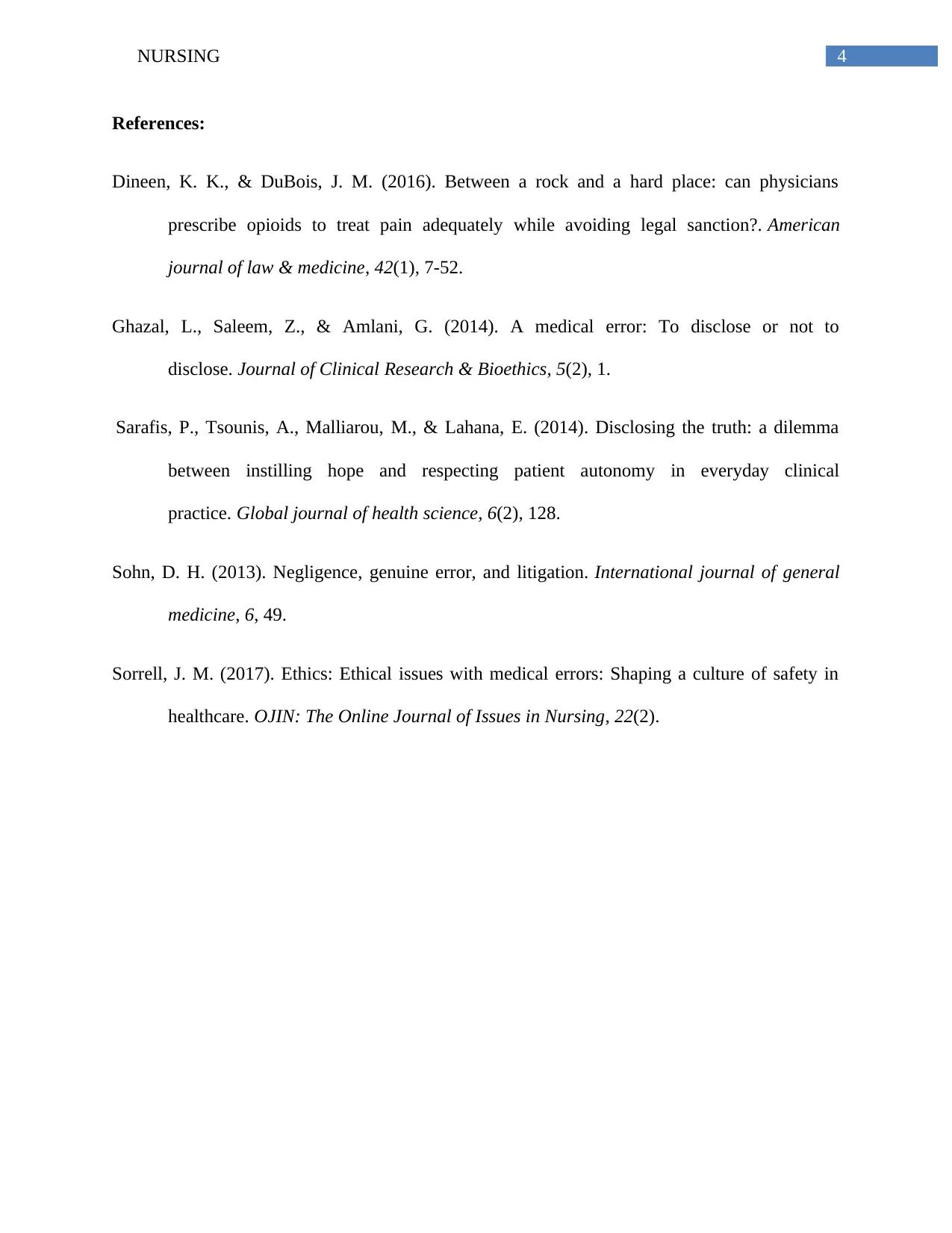
4NURSING
References:
Dineen, K. K., & DuBois, J. M. (2016). Between a rock and a hard place: can physicians
prescribe opioids to treat pain adequately while avoiding legal sanction?. American
journal of law & medicine, 42(1), 7-52.
Ghazal, L., Saleem, Z., & Amlani, G. (2014). A medical error: To disclose or not to
disclose. Journal of Clinical Research & Bioethics, 5(2), 1.
Sarafis, P., Tsounis, A., Malliarou, M., & Lahana, E. (2014). Disclosing the truth: a dilemma
between instilling hope and respecting patient autonomy in everyday clinical
practice. Global journal of health science, 6(2), 128.
Sohn, D. H. (2013). Negligence, genuine error, and litigation. International journal of general
medicine, 6, 49.
Sorrell, J. M. (2017). Ethics: Ethical issues with medical errors: Shaping a culture of safety in
healthcare. OJIN: The Online Journal of Issues in Nursing, 22(2).
References:
Dineen, K. K., & DuBois, J. M. (2016). Between a rock and a hard place: can physicians
prescribe opioids to treat pain adequately while avoiding legal sanction?. American
journal of law & medicine, 42(1), 7-52.
Ghazal, L., Saleem, Z., & Amlani, G. (2014). A medical error: To disclose or not to
disclose. Journal of Clinical Research & Bioethics, 5(2), 1.
Sarafis, P., Tsounis, A., Malliarou, M., & Lahana, E. (2014). Disclosing the truth: a dilemma
between instilling hope and respecting patient autonomy in everyday clinical
practice. Global journal of health science, 6(2), 128.
Sohn, D. H. (2013). Negligence, genuine error, and litigation. International journal of general
medicine, 6, 49.
Sorrell, J. M. (2017). Ethics: Ethical issues with medical errors: Shaping a culture of safety in
healthcare. OJIN: The Online Journal of Issues in Nursing, 22(2).
1 out of 5
Related Documents
Your All-in-One AI-Powered Toolkit for Academic Success.
+13062052269
info@desklib.com
Available 24*7 on WhatsApp / Email
![[object Object]](/_next/static/media/star-bottom.7253800d.svg)
Unlock your academic potential
Copyright © 2020–2026 A2Z Services. All Rights Reserved. Developed and managed by ZUCOL.




